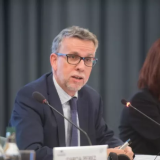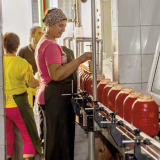
Pracovné podmienky a udržateľná práca
Pracovné podmienky a udržateľná práca sú jednou zo šiestich hlavných činností v pracovnom programe nadácie Eurofound na obdobie rokov 2021 – 2024. Nadácia Eurofound bude naďalej pôsobiť ako centrum odborných znalostí na monitorovanie a analyzovanie vývoja v tejto oblasti vrátane informácií o tom, aký má kríza spôsobená ochorením COVID-19 vplyv na pracovné podmienky a kvalitu práce, ako aj na postupy na pracoviskách.
V priebehu rokov 2021 – 2024 poskytne nadácia Eurofound dôležitý pohľad na výzvy a vyhliadky súvisiace s pracovnými podmienkami a udržateľnou prácou v EÚ. Na základe dlhodobých odborných znalostí v tejto oblasti bude nadácia Eurofound skúmať trendy a pokrok v priebehu času a identifikuje vznikajúce obavy spojené s pracovnými podmienkami a kvalitou práce. Analýza bude zahŕňať rôzne krajiny, odvetvia, povolania a skupiny pracovníkov v tematických okruhoch, ako sú napríklad organizácia práce a telepráca, pracovný čas, rovnováha medzi pracovným a súkromným životom, rovnaké zaobchádzanie, ochrana zdravia a pohoda na pracovisku, zručnosti a odborná príprava, mzda a perspektíva a spokojnosť s prácou. Osobitná pozornosť sa bude venovať neštandardným formám zamestnania, najmä samostatnej zárobkovej činnosti.
Vzhľadom na demografickú výzvu, ktorej EÚ čelí v podobe starnúcej populácie a rastúcej rozmanitosti pracovného života, bude nadácia Eurofound naďalej skúmať faktory umožňujúce zostať väčšiemu počtu zamestnancov dlhšie v zamestnaneckom pomere. Pozornosť sa taktiež zameria na zlepšovanie kvality práce ako faktora väčšej účasti na trhu práce a zvýšenej motivácie zamestnancov, prispievajúceho k udržateľnej práci v priebehu života.
V úzkej spolupráci s Európskou agentúrou pre bezpečnosť a ochranu zdravia pri práci (EU-OSHA) sa budú skúmať súvislosti medzi prácou a zdravím. Eurofound plánuje na základe spolupráce s Medzinárodnou organizáciou práce (ILO) rozvíjať činnosti v otázkach budúcnosti práce a pracovných podmienok na globálnej úrovni.
- Infografika: Pracovné podmienky a udržateľná práca v EÚ
„Celkovo sú to dobré správy, pretože pracovné podmienky sa v Európskej únii zlepšujú – i keď veľmi pomaly – obavou však je, že sa tak nemusí diať v prípade všetkých skupín zamestnancov. Závisí to v mnohom od odvetvia, v ktorom pracujete, ďalej od dosiahnutého vzdelania a aj od toho, či ste muž alebo žena.“
Barbara Gerstenberger, vedúca oddelenia pre pracovný život



























